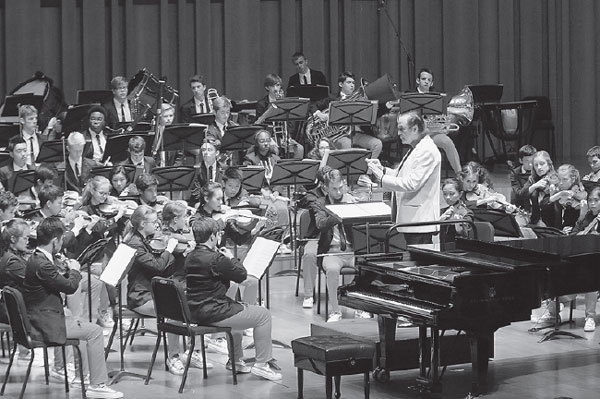Conducting in the fast lane
Updated: 2015-08-24 16:40
By Chen Jie(China Daily USA)
|
||||||||
Charles Dutoit keeps a mad schedule of traveling around the world. Chen Jie catches up with the maestro in Beijing.
It's hard to believe it's a 79-year-old's schedule - flying around the world twice in one month, including a 14-day tour in China, and spending just two days in each city.
But that's what maestro Charles Dutoit just did.
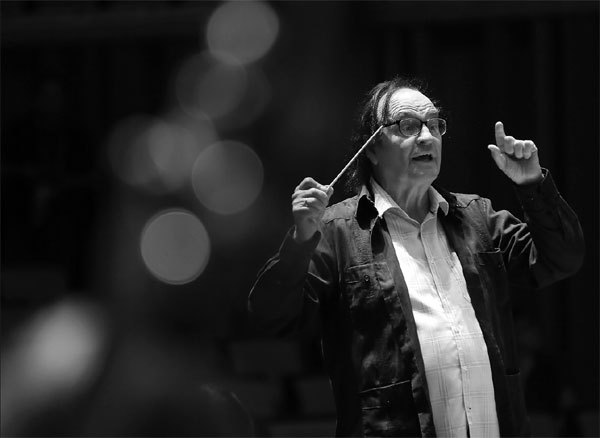
|
Charles Dutoit and the National Youth Orchestra of the USA stage a concert in Beijing in July. Provided to China Daily |
After conducting two concerts by the New York Philharmonic Orchestra at Central Park on June 18 and 19, he flew to Geneva.
He next went to Shanghai, where he closed the Shanghai Symphony Orchestra's 2014/15 season on June 28, and then performed with the New York Philharmonic on July 5, at the Music In the Summer Air festival there.
He then returned to New York to conduct the National Youth Orchestra of the USA at Carnegie Hall on July 11. The following day, he traveled back to Beijing to tour the country with the NYO, finishing in Hong Kong on July 26.
The day after, he flew to Switzerland for the Verbier Festival's closing concert. He's now with the Boston Symphony Orchestra at Tanglewood in Lenox.
Dutoit will return in April for two weeks with the Shanghai Symphony Orchestra.
"I've been traveling all my life," Dutoit tells China Daily in Beijing.
"As a conductor, I've performed some 130 concerts a year and at least about 50 on tour.
"I enjoy working with young people."
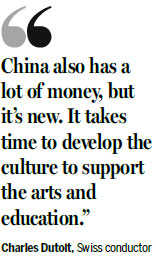
The NYO-USA is an annual training program founded by Carnegie Hall's educational arm, the Weill Music Institute.
"Maestro Dutoit has great experience in working with young professionals," Carnegie Hall's public relations director, Synneve Carlino, says.
"He is the music director of the Verbier Festival Orchestra and also takes care of many training programs in Asian cities, such as Guangzhou and Tokyo."
The Swiss conductor says the main difference is that most of the NYO's students don't major in music and may become lawyers or doctors one day.
"It's incredible to put young people from high schools together," he says.
"They came from 37 states and didn't know each other before. After 10 days of work, they could play a very hard program."
Carnegie Hall has the initiative to do such educational programs and it is possible in China, too, because there are many bright young musicians, he adds.
In 2005, Dutoit joined Chinese conductor Yu Long to start the Canton International Summer Music Academy in Guangdong province's capital, Guangzhou, to train young musicians.
He has made 25 trips to China as a musician and two as a tourist.
His first visit was to Beijing in 1982.
In '86, he returned to tour the country.
Early visits sparked an interest in Chinese art. He has collected porcelain and paintings from the Tang (AD 618-907) and Ming Dynasties (1368-1644).
"I wanted to know China more. It's a very old dream, since I came very early," he says.
He has since visited as a conductor with the French National Orchestra; the NHK Symphony Orchestra; the Verbier Festival Orchestra; London's Royal Philharmonic Orchestra; the Philadelphia Orchestra; the Boston Symphony Orchestra; and the New York Philharmonic.
His first collaboration with a Chinese orchestra was in 1995, with the National Symphony Orchestra.
He later worked with the China Philharmonic, Shanghai Symphony and Guangzhou Symphony.
"I've seen the improvement of the Chinese orchestras as well as the development of classical music in the country," he says.
"I think you should attribute the development to Yu Long, who is Mr China in the music world. He is a genius - not only as a conductor, but (he's) good at organizing things. He is the one who has made it work internationally."
Dutoit and Yu met at a dinner with the American violinist Isaac Stern (1920-2001), during the Beijing Music Festival in 1999. It was the 20th anniversary of Stern's first visit to China.
In 1979, Stern had visited Beijing and Shanghai, collaborating with Chinese conductor Li Delun (1917-2001) and the China National Symphony Orchestra. He coached many music students while visiting. That three-week trip was filmed and made into the Academy Award-winning 1980 documentary From Mao to Mozart.
Yu invited Stern back to Beijing in 1999 to perform with Li and the students he had coached 20 years ago.
Dutoit has since performed many times at the Beijing Music Festival that Yu founded in 1998.
The Swiss conductor has been invited to work as co-director of Shanghai's annual Music In the Summer Air festival Yu founded in 2010.
"I really appreciate maestro Dutoit's commitment to China," Yu says.
"I'm proud to have been with him in many first initiatives in China. He teaches me a lot and helps to build a bridge between China and the world music scene."
Dutoit says it was a little difficult for Yu at first.
"Chinese musicians, teachers and old people were protecting their own work. They didn't want much interference by foreigners," he says.
"But now they've become more open to the world, and we see Chinese musicians all over the world, in great orchestras."
The first cello of the Philadelphia Symphony Orchestra is from Shanghai and the first oboe in the New York Philharmonic is also Chinese, he cites as examples.
Chinese pianist Li Yundi is touring with Dutoit and the NYO-USA.
People often compare Li with celebrated Chinese pianist Lang Lang, since they're the same age and both became internationally famous at the same time.
But Dutoit asks: Why compare?
"They are very different, and they are both good players."
Lang Lang, of course, is establishing himself not only as a pianist, but also as a musician who does some commercial things. He is probably more known than others because of that, he says.
"But they are both very good. It's always a pleasure to work with them."
He says Chinese musicians show tremendous potential, but there's no tradition of social support.
"You see, New York is New York. There are lots of people and money supporting ideas. And there is a tradition to support institutions. The Rockefeller Foundation helped to establish Lincoln Center for the Performing Arts. Carnegie Hall also has many patrons," he explains.
"China also has a lot of money, but it's new. It takes time to develop the culture to support the arts and education. And the audience will also improve. Be patient. It's clear that China is leading many things in the world and also in music."
Contact the writer at chenjie@chinadaily.com.cn
(China Daily USA 08/24/2015 page8)
- Tsipras formally resigns, requesting snap general elections
- China-Russia drill not targeting 3rd party
- UK, France boost security
- China demands Japan face history after Abe's wife visits Yasukuni Shrine
- DPRK deploys more fire units to frontlines with ROK
- DPRK, ROK trade artillery, rocket fire at border

 Giant panda Bao Bao celebrates two-year birthday
Giant panda Bao Bao celebrates two-year birthday
 Across America over the week (Aug 14 - Aug 20)
Across America over the week (Aug 14 - Aug 20)
 Stars in their eyes: leaders in love
Stars in their eyes: leaders in love
 A survival guide for singles on Chinese Valentine’s Day
A survival guide for singles on Chinese Valentine’s Day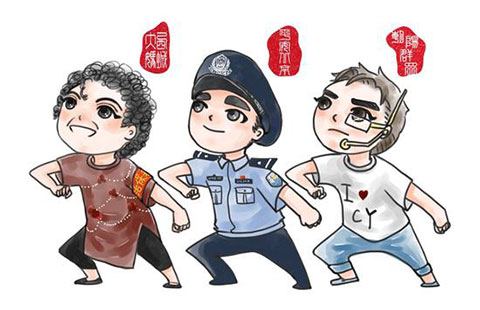
 Beijing police publishes cartoon images of residents who tip off police
Beijing police publishes cartoon images of residents who tip off police
 Rare brown panda grows up in NW China
Rare brown panda grows up in NW China
 Putin rides to bottom of Black Sea
Putin rides to bottom of Black Sea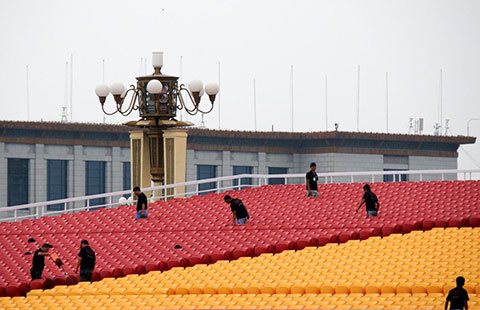
 The changing looks of Beijing before V Day parade
The changing looks of Beijing before V Day parade
Most Viewed
Editor's Picks

|

|

|

|

|

|
Today's Top News
China advocates practical cooperation between LatAm, East Asia
Giant panda gives birth at Washington's National Zoo
Emissions data won't change China policy
Preparations shutter Forbidden City, other major tourist spots
President Xi Jinping calls for crews not to ease up
Chemical plants to be relocated in blast zone
Asian sprinters on track to make some big strides
Jon Bon Jovi sings in Mandarin for Chinese Valentine's Day
US Weekly

|

|
